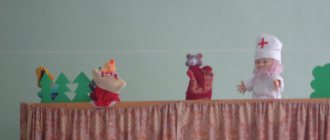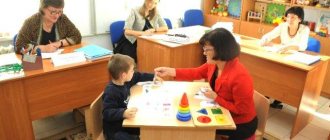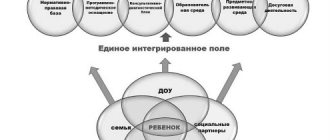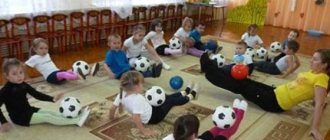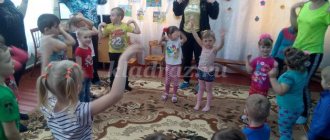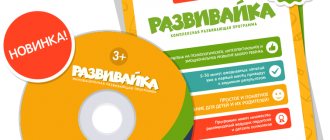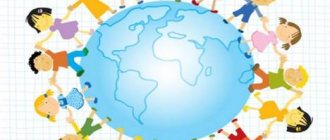“Preserving and strengthening the health of children in preschool educational institutions”
Preserving and strengthening the health of children in preschool educational institutions
Raising a healthy child is one of the most important tasks of a family and preschool institution.
Health is not only the absence of disease or physical defects, but also complete physical, mental and social well-being. It is the most important indicator that reflects the biological characteristics of the child, the conditions of upbringing, education of children, their life in the family, the quality of the environment, the degree of development of medical care, maternal and child health services, and ultimately the state’s attitude to health problems.
In a preschool educational institution, the primary task is to protect and strengthen the health of children. The work of teachers is aimed at maintaining a cheerful, cheerful mood in the child, preventing negative emotions and nervous breakdowns; improvement of all body functions, full physical development, nurturing interest in various available types of motor activity, forming the foundations of physical culture, the need for daily physical exercise, nurturing positive moral and volitional qualities.
Physical education in a preschool educational institution is carried out both in
special physical education classes, and in play activities and in the daily life of children, in various forms of organizing motor activity .
Favorable sanitary and hygienic conditions are created in the kindergarten, a daily routine is observed, and caring care is provided for each child based on a person-oriented approach; nutritious meals and daily exposure to fresh air are provided; Tempering activities and morning exercises are systematically carried out at all times of the year, and if appropriate conditions are available, swimming lessons are organized for children. In all age groups, much attention is paid to developing correct posture in children.
The expansion of the child’s individual motor experience, consistent learning of movements and motor actions: correct, rhythmic, easy walking, running, the ability to jump from a place and with a running start, various types of throwing, climbing, movements with balls, do not go unnoticed. Children are taught to clearly, rhythmically, and at a certain pace perform various physical exercises by demonstration and based on verbal descriptions; the learned movements are performed to music.
Educators create an environment in a preschool institution that is conducive to the development of personal hygiene skills. Children are taught to understand the value of a healthy lifestyle, to take care of their health, and are introduced to the basic rules of safe behavior.
Various types of hardening procedures are systematically carried out under the guidance of a medical professional, taking into account the individual characteristics of children.
Morning exercises are held daily
in a ventilated area.
During organized educational activities that require a lot of mental stress, and in the intervals between them, physical education sessions lasting 1-3 minutes are held.
In a preschool institution, the leading activity is play
. In order to prevent overwork in preschool educational institutions, traditional classes are replaced by complex ones, which are conducted in a playful way.
Teachers provide sufficient age-appropriate motor activity for children throughout the day, using outdoor activities, sports, folk games and physical exercises.
Every month there are physical training exercises and holidays
.
At the present stage, the task of our society is to educate healthy, harmoniously developed people with high mental and physical performance. To successfully solve this problem, it is important, as they say, to “take care of your health from a young age.” This means that it is necessary to strengthen the child’s health from the first days of his life.
An effective means of promoting health, reducing morbidity and increasing the level of performance of children is hardening the body. Sun, air and water are factors whose systematic exposure increases the body’s resistance to changing weather conditions.
Hardening
– this is not only wiping or dousing, but also everyday ordinary procedures that do not require special organization or additional time: staying indoors and outdoors in appropriate clothing, washing with cool water, sleeping with an open vent or window, active physical exercise.
Air acts as a complex irritant, enhancing metabolic processes, increasing the amount of hemoglobin and red blood cells, strengthening the nervous system. Its beneficial effect is also manifested in the child’s mood - he becomes cheerful and cheerful. It is necessary to use fresh air for hardening purposes constantly, at any time of the year. Cold winter air in combination with active physical exercise and games has a particularly beneficial effect. For the proper development of a child, it is important that he is exposed to the air for 4-5 hours in winter, and almost all day in summer. When organizing outdoor walks for children, adults should create conditions for their active activities.
A good way to improve health is water hardening.
Children love to play with her; Such activities improve the mood and evoke joyful emotions in the child. This should be used to improve the health of the body. It is better to start water procedures in the warm season. Wash the children with cool water. First, wash your hands up to your elbows, then your neck and face.
One of the effective methods of hardening is contrasting dousing of the feet: first with cold water - 24-25 degrees, then warm - 36 degrees and again cold.
The most powerful healing and hardening remedy is swimming in a pond. For a healthy child, it is permissible from the age of 2 years at an air temperature of 25 - 28 degrees and a water temperature of at least 22 degrees.
It must be remembered that the hardening effect of the applied influences depends on the systematicity, continuity of use, gradually increasing intensity of the procedures, and taking into account the individual sensitivity of the child.
If measures to improve a child’s health, carried out in kindergarten, are complemented by daily exercises and outdoor games in a family environment, he develops individual inclinations and interests. Children are especially susceptible to the beliefs, positive behavior of their father, mother, and family lifestyle. Therefore, the educator needs to improve the methods of pedagogical propaganda among parents, to involve them in the active pedagogical process, so that the knowledge they acquire is embodied in the specific work of raising children.
Of great importance in the process of developing good posture are a strictly observed daily routine, the size of furniture, and the posture of children during organized educational activities, labor and other types of independent activities.
Morning exercises are one of the most important components of children’s motor regimen. It is aimed at improving the health, strengthening, increasing the functional level of body systems, developing the physical qualities and abilities of children, and consolidating motor skills. The need to start doing morning exercises after waking up develops the child’s volitional qualities: will, perseverance, discipline, perseverance, independence.
Morning exercises are also valuable because children develop the habit of performing various exercises every day in the morning. Over time, this useful habit turns into a need and remains with the person for life.
After intense physical activity, breathing exercises are necessary to restore breathing. In preschool children, the respiratory muscles are weak, so breathing exercises are very useful. They promote full physical development and prevent diseases of the respiratory system.
Early childhood is a period of intense physical and mental development. It is at this age that the mental and moral development of a child especially depends on his physical condition and mood.
Preschool education plays a significant role in creating conditions for the harmonious development of a person, which is impossible without physical education.
To this end, to make physical education classes interesting and exciting for children, teachers develop a variety of entertaining elements aimed at activating children’s motor activity, developing dexterity and coordination.
The great value of every person is health.
Raising a child strong, strong, and healthy is the desire of parents and one of the leading tasks facing a preschool institution.
The joint activities of teachers - children - parents allows:
- increase the efficiency of work on children's health;
- obtain the necessary knowledge about the physical development of the child;
- create a need for a healthy lifestyle in your family;
- reduce the “deficit” of positive emotions in children, create a festive atmosphere during joint sports activities;
- see and learn about the work of a kindergarten on the physical development of children;
- to ensure continuity of methods and techniques of raising children in the family and in kindergarten.
Many years of experience in such work show that the results of physical education and sports are high when there is interaction between the family and the kindergarten.
Working together helps to strengthen and preserve the child’s health, develop his strength and endurance, physical abilities, and increase his body’s resistance to disease.
It is necessary to teach children from an early age:
- safety at home;
- the ability and desire to be neat and tidy;
- introduce the rules of communication with animals;
- develop road behavior skills;
- cultivate caution in communication;
- establish rules of behavior on the water and in public;
- develop aesthetic taste.
Only the professional competence of teachers of a preschool educational institution, love for their profession and, of course, for children, contribute to the preservation and strengthening of children’s health. Children are the future of our society. And, therefore, their well-being depends on us.
action plan for children's health; methodological development
Approved
Head of GBDOU No. 11
Nevsky district
/_______________/Rusakova O.P.
Order No.____from_______
Additional plan of events
To the annual plan of measures to protect the health of pupils
for the 2021-2022 academic year
GBDOU No. 11 Nevsky district
| No. | Events | Period of execution | Responsible executor |
| 1. | Inclusion of issues of protecting and promoting children's health in the content of operational meetings with employees of the institution. | October | Manager |
| 2. | Conducting routine instruction on protecting the life and health of children with teachers. | October, | Manager Deputy Head of Internal Affairs |
| 3. | Conducting routine instruction on life and health protection with children. | Daily | Teachers |
| 4. | Conducting educational activities in physical culture and sports, teaching traffic rules and healthy lifestyle skills. | According to the comprehensive thematic planning of the OOPDO | Physical education instructor |
| 5. | Familiarization of the preschool educational institution staff with regulatory documents on the protection of the life and health of pupils and the prevention of childhood injuries. | During a year | Manager Deputy Head of Internal Affairs |
| 6. | Consultation "First aid for..." | October | nurse |
| 7. | Consultation “Prevention of child injuries” | november | Deputy Head of Internal Affairs Senior teacher |
| 8. | Additional instruction with preschool employees on: - organizing the protection of the life and health of children; -prevention of child injuries, road accidents; - labor protection and compliance with safety requirements in the workplace; | October | Manager |
| 9. | Training students in the basics of life safety in accordance with the annual plan. | During the school year | Educators |
| 10. | Timely provision of labor safety briefings | monthly | Deputy Head of Internal Affairs Senior teacher |
| 11. | Methodological meeting of teachers on issues of health protection for students | November | Deputy Head of Internal Affairs Senior teacher |
| 12. | Conducting operational control. “Children’s health protection system in preschool settings” | November | Deputy Head of Internal Affairs Senior teacher |
| 13 | Conversations with children: — “Rules for the safe behavior of preschool children when going up and down flights of stairs (stairs) - “Careful steps” — “How to behave in kindergarten” | October November | Educators |
| 14. | Conducting leisure activities to protect life and health at home: — Journey to the Land of Security — “Journey to the Land of Road Signs” — “Fun safety lessons in kindergarten” | October November | Educators |
| 15 | Development of a movement algorithm for participants in the educational process along flights of stairs. | October | Deputy Head of Internal Affairs Senior teacher |
Report on the implementation Additional action plan
To the annual plan of measures to protect the health of pupils
for the 2021-2022 academic year
GBDOU No. 11 Nevsky district
| No. | Events | Period of execution | Completion mark |
| 1. | Inclusion of issues of protecting and promoting children's health in the content of operational meetings with employees of the institution. | October | Done |
| 2. | Conducting routine instruction on protecting the life and health of children with teachers. | October, | Done |
| 3. | Conducting routine instruction on life and health protection with children. | Daily | Done |
| 4. | Conducting educational activities in physical culture and sports, teaching traffic rules and healthy lifestyle skills. | According to the comprehensive thematic planning of the OOPDO | Done |
| 5. | Familiarization of the preschool educational institution staff with regulatory documents on the protection of the life and health of pupils and the prevention of childhood injuries. | During a year | Done |
| 6. | Consultation "First aid for..." | October | Done |
| 7. | Consultation “Prevention of child injuries” | november | Done |
| 8. | Additional instruction with preschool employees on: - organizing the protection of the life and health of children; -prevention of child injuries, road accidents; - labor protection and compliance with safety requirements in the workplace; | October | Done |
| 9. | Training students in the basics of life safety in accordance with the annual plan. | During the school year | Done |
| 10. | Timely provision of labor safety briefings | monthly | Done |
| 11. | Methodological meeting of teachers on issues of health protection for students | November | Done |
| 12. | Conducting operational control. “Children’s health protection system in preschool settings” | November | Done |
| 13 | Conversations with children: — “Rules for the safe behavior of preschool children when going up and down flights of stairs (stairs) - “Careful steps” — “How to behave in kindergarten” | October November | Done |
| 14. | Conducting leisure activities to protect life and health at home: — Journey to the Land of Security — “Journey to the Land of Road Signs” — “Fun safety lessons in kindergarten” | October November | Done |
| 15 | Development of a movement algorithm for participants in the educational process along flights of stairs. | October | Done |
Creating conditions for preserving the health of preschool students Article on the topic
Creating conditions for preserving the health of preschool children
Leontyeva I.V., teacher
MADO CRR DS No. 476
Chelyabinsk
The catastrophic state of children's health requires systematic work on health conservation and optimal use of the material, intellectual, and creative resources of a preschool institution.
If there is health, a person is happy, lives peacefully, works, studies, goes to kindergarten. Without health you cannot live, you cannot love, you cannot be beautiful, charming. The first steps towards health, the desire for a healthy lifestyle, towards self-knowledge, and the formation of a culture of health are taken in a preschool institution. The need for an integrated approach to organizing a health-preserving space in a preschool institution does not raise any doubts.
One of the primary tasks of a preschool institution is the organic combination of the educational process with the preservation and strengthening of children’s health. The means to solve this problem are various forms of organizing motor activity, hardening and health-improving activities.
In the content of the educational activities of preschool educational institutions, much attention is paid to the improvement of pupils’ health and the implementation of the following preventive and health-improving measures and procedures:
* determination of the optimal load on the child, taking into account age and individual characteristics,
* massage and self-massage;
* gymnastics for the eyes;
* breathing exercises;
* exercises to prevent scoliosis, flat feet, game exercises to relax the body - auto-training;
* sports holidays, including outdoor games, relay races, team games, competitions, obstacle courses;
* assessment of the emotional state of children with subsequent individual work with the child;
* integration of physical development with other subjects: mathematics, speech development, design, valeology, theatrical and play activities, sensory skills;
* creating an atmosphere of psychological comfort: responsiveness and attention to children;
* organization of a developmental environment taking into account the needs and interests of children;
* play therapy;
* working with parents to jointly care for the health of their children;
* proper organization of motor activity of children during a walk.
We try to organically connect all the elements of the complex with each other:
- Educational
- Medical and preventive
- Physical education, recreation and sports
- Psychological
From the above, the main directions for creating a health-saving space in kindergarten follow:
- Organization of sanitary and epidemiological regime and creation of hygienic living conditions for children.
- Physical education
- Organization of treatment and preventive work with children
- Ensuring the psychological safety of children during their stay in kindergarten
Model for introducing preschool children to a healthy lifestyle in preschool educational institutions
Every day of a child in kindergarten begins with morning exercises, if possible in the fresh air, which allows you to get a boost of energy and gives an incentive to work activity in class. In the morning period of time, children bear the heaviest load; classes take place at this time. Classes require children to endure prolonged stress associated with maintaining a certain posture and significant visual stress. In this regard, we include health-improving activities in the educational process: eye exercises, breathing exercises, physical exercises, which are necessary to relieve psycho-emotional stress.
Physical education classes vary in form and content depending on the objectives:
- Traditional
- Gaming in the form of outdoor games of low, medium and high intensity.
- Role-playing, giving more emotional impressions, for example: “Excursion to the spring forest.”
- Thematic lessons: “Autumn has come to visit us,” or with one subject, “Play ball with me.”
- Classes - training is the consolidation of exercises familiar to children, elements of sports games.
- Sports holidays, health days, the holiday “Dad, Mom and I are a sports family.”
We teach children not only the rules of behavior on the roads, but also gives an idea of a healthy lifestyle. This includes classes:
- "Talk about proper nutrition"
- “Formation of the habit of daily physical education performances”
- “Formation of ideas about what is useful and what is harmful to the body”
- Developing knowledge and skills to act in dangerous life situations.
It is extremely important and necessary to form in children of each age group a calm motivation to develop hygienic skills, abilities, and habits that lead to maintaining health and ensuring a healthy lifestyle. Such a problem can only be solved through the joint efforts of doctors, educators, specialists and parents.
After classes, it’s time for walks, a dynamic change in activity occurs. Therefore, our walks consist of outdoor and sports games, relay races and competitions; for this purpose, physical education equipment is provided at each site: stairs, snakes, running paths, ball rings, equipment for crawling, stepping over, climbing over, areas for outdoor games, play equipment .
Issues regarding the child’s health are resolved in close contact with the family. At the beginning of the health-improving period, a conversation is held with parents, which makes it possible to find out their attitude towards health-improving activities and draw up a plan for health-improving work, taking into account the parents’ requests. The kindergarten offers an extensive range of recreational activities:
- Compliance with temperature conditions according to SanPiNa.
- Proper organization of walks and their duration (the schedule of activities is compiled taking into account the duration of the walk for at least one and a half hours
- Compliance with seasonal clothing (individual work with parents)
- Lightweight clothing in kindergarten
- Gymnastics after sleep
- Hardening procedures (according to the age of the children)
- Salt tracks - younger age
- Washing hands up to the elbows with cool water – middle age
- Complex of contrast hardening procedures – older age
- Rinsing the mouth with medicinal infusions and cool water
- Walking barefoot on the playground in summer
- Self-massage
- Vitamin therapy
- Phytotherapy
- Massage as prescribed by a doctor
Prospect: continue medical and health work, dividing it into three stages:
Stage 1 – intensive prevention – preparing the child for the most unfavorable time of the season (vitamin therapy, herbal medicine, breathing exercises, hardening)
Stage 2 is restorative, in which a system of protective measures is used to prevent ARVI, sore throats - rinsing the throat and mouth with medicinal herbs and infusions.
Stage 3 – rehabilitation – herbal and vitamin therapy, gentle exercise regime, individual approach according to health group.
Expected Result:
- Creation of comprehensive monitoring of child health;
- Reducing the number of days of illness in children;
- Reducing the number of injuries;
- Providing conditions for the practical implementation of an individual approach to raising children;
- Advanced training for kindergarten staff.
Bibliography:
1. Rezanova T.S., Zaitsev V.P., Titova A.A. Physical education in kindergarten is the most important factor in children’s health //Modern technologies and health programs of the health process in physical culture and sports in educational institutions” materials of the international scientific and practical conference, Belgorod, BelGTASM publishing house, 2002.
2. https://doshvozrast.ru/ozdorov/ozdorovlenie10.htm
Pedagogical project “Towards health through cooperation”
- May 16, 2016
Relevance. The health of a child from the first days of life depends on the microsociety that surrounds him.
This circumstance imposes special responsibility on family members, and primarily on parents. Often, parents' knowledge about measures to preserve and improve health is not consistent with their actions. Value orientations regarding the importance of health are not relevant and, in this regard, are not implemented in the everyday life of parents. Thus, the further search for effective ways to preserve and strengthen the health of preschool children should include increasing the role of parents in improving the health of children, introducing them to a healthy lifestyle, and creating traditions of family physical education.
An important place in solving these socially significant problems is occupied by the kindergarten, which can act as a kind of center for promoting a healthy lifestyle, nurturing a family culture, and developing in parents knowledge, skills and abilities on various aspects of preserving and promoting health for both children and adults . Only with the joint purposeful activities of parents and teachers can positive dynamics of indicators characterizing the health of children and their orientation towards a healthy lifestyle be ensured.
This project is aimed at establishing continuous connections between kindergarten and parents in matters of health care and increasing parental competence in these matters. In modern conditions, a kindergarten is designed not only to ensure the quality of the educational process, but also to preserve the health of children.
It is generally accepted that the foundation of a child’s health is laid in the family. An important element of the family structure is physical education. Physical education contributes to both the full development and strengthening of children’s health, and the establishment of a favorable family microclimate.
In accordance with the Law of the Russian Federation “On Education” and the standard regulations on a preschool educational institution, one of the main tasks facing a kindergarten is “interaction with the family to ensure the full development of the child.” From this position, the center of work on the full physical development and improvement of children should be the family and kindergarten as two main social structures that determine the level of health of the child. Thus, in order to maintain and improve the health of children in one of the most crucial periods of life, a lot of work with the family is required.
Having analyzed the current situation regarding issues of health conservation in the practice of preschool education, it can be stated that considerable attention is being paid to this problem. A system of physical education and health activities has been created. Based on the fact that the formation of health-saving skills lies primarily in the family, an assessment of the health potential was carried out.
Parents know and understand the importance of health-improving activities, but more than 80% do not do morning exercises, do not have basic sports equipment at home, and do not attend sports facilities on weekends. More than 60% do not follow a daily routine and diet.
The main preventive measure in the family is vaccination. This attitude of parents towards health conservation issues directly affects the health of their children. The knowledge of parents of preschool children about measures to preserve and improve health is not consistent with their actions and, in this regard, is not implemented in everyday life.
V.G. Alyamovskaya points out that the health care system should be understood not only by teaching staff, but also by parents. T.S. Ovchinnikova expresses the opinion that the center of work on preserving the health of children should be not only the kindergarten, but also the family, since it is these two social structures that mainly determine the level of health of the child.
The goal of the project : innovative transformations to achieve a new quality of health work in preschool educational institutions.
Project type: methodological, long-term.
Duration of the project: 1 year.
Project participants: teachers, preschool medical staff, parents, children.
Main objectives of the project:
- Updating the role of the family in the physical education of preschool children, forming harmonious relationships between children and adults.
- Protecting and strengthening the physical and mental health of children (including their emotional well-being).
- Formation of practical skills in children and parents in the field of physical education.
- Creation of a system for monitoring the health status of pupils and parents.
- Designing an innovative model of cooperation between kindergarten and family to develop a conscious, creative, caring attitude towards children’s health in order to improve its level;
- Replenishment of the preschool institution's material resources with sports and medical equipment.
Feature of the project: Parents are active participants in recreational activities organized at the preschool educational institution.
Project stages
1. Preparatory “Let’s get to know each other”
Purpose: to study the professional capabilities of teachers, knowledge, abilities, skills of students, pedagogical awareness and the culture of a healthy lifestyle of parents.
- Questioning of teachers.
- Monitoring the psychological health of preschool children (O. Khukhlaeva).
- Parent survey.
2. Practical “Learning by playing”
Goal: instilling in children and parents the skills to strengthen and maintain health, creating the need for a healthy lifestyle, increasing the level of health work in kindergarten and at home.
- Work with teachers: scenarios for holding Health Days and Weeks are being developed, the activities of the “Healthy Family – Healthy Child” club are being planned, and master classes are being organized.
- Work with pupils: a motor regime model is implemented, competitions and sports festivals are held.
- Working with parents: participants in sports entertainment, holidays.
3. Evaluation “Healthy family – healthy child”
Goal: analysis of the effectiveness of the project by determining the health status of students, the formation of motivation for a healthy lifestyle of children and parents.
- Work with teachers: development of methods for assessing the level of knowledge, exchange of experience.
- Working with children: results of monitoring on the Psychological health of preschoolers.
- Work with parents: participation in final classes and events.
Forms of work.
| Forms of work | ||
| With the teaching staff | With pupils | With parents |
| Preparatory stage “Let's get acquainted” (September October November) | ||
1. Questionnaire:
2. Diagnostics “Knowledge and experience in developing healthy lifestyle habits in preschoolers.” 3. Production of visual aids, non-standard equipment, health tracks for hardening. 4. Creation of a card index of outdoor games by age group. 5. Study of new health-saving technologies. 6. Preparation and execution of the “Group Health Folder”. 7. Design
| 1. Diagnostics of the formation of physical qualities, mastery of the main types of movements. 2. Initial monitoring of children’s health status, drawing up a health passport (children’s health group). 3. Monitoring the psychological health of preschool children (according to the method of O. Khukhlaeva) 4. Interviewing “How I take care of my health.” | 1. Questionnaire:
2. Poster competition “Healthy lifestyle” 3. Competition “Our Inventions” (production of non-standard equipment). 4. Studying the need to acquire practical skills for improving a child’s health. |
| Practical stage “Learning, playing” (December January February). | ||
| 1. Preparation and holding of Health Days. 2. Organization of Health Weeks. 3. Preparation and holding of sports events and entertainment with the participation of parents. 4. Creative group “Creating a model of the motor mode.” 5. Master class “Outdoor games in kindergarten”. 6. Consultations “Personal hygiene”, “Physical training and other ways to maintain health”. 7. Brainstorming “Healthy lifestyle in kindergarten.” 8. Booklet competition for parents “Health is great!” | 1. Development of long-term planning for healthy lifestyle. 2. Physical education classes (plot-based, integrated, thematic). 3. Implementation of a motor mode model during the day. 4. Preventive measures (acupressure, finger, breathing exercises). 5. Drawing competition “Take care of your health from a young age” 6. Sports holidays, Health Days. 7. Organization of a Pioneerball sports club (senior preschool age). 8. Group projects:
| 1. Physical education workshops (once a month). 2. Family video film competition “We can’t live without health. We are friends with health" 3. Exhibition of drawings
4. Sports activities together. 5. Parents' living rooms. 6. Creative drawing competition
7. Interfamily projects
8. Trainings on hardening and breathing exercises. 9. Information baskets, stands, reminders, screens. |
| Evaluation stage “Healthy family – healthy child” (March April May). | ||
| 1. Pedagogical Council “Improving the interaction between the staff of a preschool institution and the family in order to effectively solve the problems of physical education and the improvement of pupils’ health, and search for optimal forms of work with parents.” Goals: 1) Contribute to the search and development of new approaches in working with parents in order to effectively solve the problems of physical education and the improvement of pupils’ health. 2) Strengthen the theoretical knowledge and practical skills of teachers in working with parents. 2. Exchange of experience of project participants. 3. Creative group “Valeological model of a graduate.” | 1.Analysis of the health of graduating groups. 2. Summing up the results of monitoring the health status of children. 3. Summing up the results of “Psychological health of preschool children” (comparative data). | 1. Summing up the results of the inter-family project competition. 2. Family sports competition. 3. Expression of gratitude to the parents who made a great contribution to the implementation of the project. |
Author: Yulia Valerievna Astapenko, deputy head of the MBDOU kindergarten for care and health care No. 72 in the city of Angarsk.
